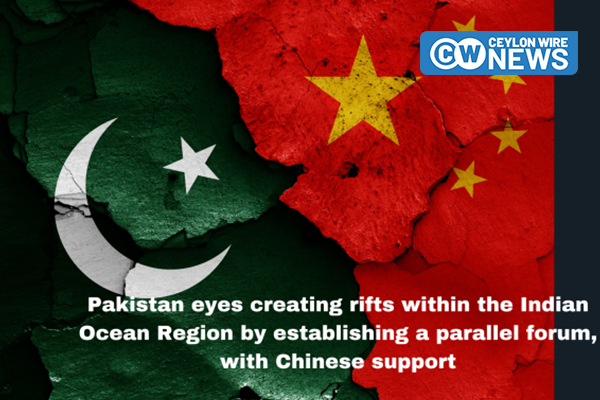Pakistan is planning to establish the Afro-Asian Ocean Forum on Maritime Cooperation (AAO-FMC) to counter India’s growing maritime and regional influence in the Indian Ocean Region (IOR). Reports suggest the government is considering opening an office for the Forum in a Tier One city like Karachi or Islamabad. However, due to financial constraints, Islamabad is seeking external funding and has approached China for a grant. China has been aggressively expanding its maritime influence in the IOR, and Pakistan has allowed China to use its territory through the China-Pakistan Economic Corridor (CPEC) to access the Indian Ocean via Gwadar Port. This raises the possibility that the new Forum could be another Chinese initiative targeting India in the IOR. Pakistan, burdened by debt to China, might have to compromise its sovereignty and foreign policy to align with Beijing’s interests in the region.
This attempt to revive the old Pakistani rhetoric of using the term “Afro-Asian Ocean” as a counter to the “Indian Ocean” is unlikely to gain support among littoral states in the region. Most members of the Association of Southeast Asian Nations (ASEAN), East African littorals, and West Asian countries are comfortable with the term “Indian Ocean” and are members of the Indian Ocean Rim Association (IORA). IORA, established in 1997, promotes economic cooperation and regional integration among countries bordering the Indian Ocean. Pakistan is not a member of IORA, and China is only a ‘dialogue’ partner, indicating both countries’ reluctance to acknowledge India’s centrality in the IOR.
Pakistan argues that the name “Indian Ocean” unfairly associates the ocean with India, giving undue prominence to one country in the region. In the past, Pakistan has even proposed renaming the ocean as the ‘Indo-Pak Ocean’ or ‘Muslim Ocean’ due to the significant Islamic presence in the region. Ironically, Pakistan used the term “Indian Ocean” in its National Security Policy 2022-2026, released in January 2022. Under the sub-heading ‘Maritime Competition’, the policy states, “the self-professed role of any one country [India] as a so-called net-security provider in the wider Indian Ocean would negatively affect the region’s security and economic interests,” reflecting Pakistan’s insecurities regarding India’s influence in the IOR. Consequently, Pakistan is attempting to promote AAO-FMC as a potential alternative to IORA.
Another reason for Pakistan’s initiative is the increasing prominence of the term ‘Indo-Pacific’ over ‘Asia-Pacific’, which has gained support from Western countries and littoral states in the IOR. China and Pakistan remain uncomfortable with the new terminology. Thus, this new Forum can be viewed as an attempt to counter both the names “Indian Ocean” and “Indo-Pacific.” Pakistan may seek support from Islamic countries that are littoral states in the Indian Ocean and members of the Organisation of Islamic Cooperation (OIC) to promote the new Forum. It is worth noting that in 1963, Indonesia objected to the term “Indian Ocean” and wanted to rename it the ‘Indonesian Ocean.’ However, Indonesia and other ASEAN countries now use the term in their official discourse. Similarly, East African countries, island states, and West Asian littorals in the Indian Ocean are comfortable with the terminology. The vision for IORA originated during a visit by the late President Nelson Mandela of South Africa to India in 1995.
The Indian Ocean Commission (IOC), established in 1982, links African Indian Ocean nations: Comoros, Madagascar, Mauritius, Réunion (an overseas region of France), and Seychelles. India holds ‘observer’ status in the IOC. These examples underscore the importance of African and African littoral states for India. On the other hand, Pakistan is trying to create rifts within the Indian Ocean Region by establishing a parallel multilateral forum with Chinese support, which is likely to be futile. Pakistan is aware that India enjoys excellent bilateral relations and strategic partnerships with member states in the region. Hence, Pakistan may only approach selected countries in the IOR and avoid reaching out to countries like Australia, which is a close partner of India and a member of the four-member Quad grouping.
Given China’s coercive military activities in the South China Sea and the broader Indo-Pacific region, which have provoked regional ire, Beijing seems to be utilizing Pakistan as a front to advance its agendas in the Indian Ocean. China may provide funding for this forum and endorse the appointment of a Pakistani military official to head the AAO-FMC. However, Pakistan lacks the diplomatic expertise and logistical capabilities to lead a sensitive multilateral forum. Additionally, littoral states may be wary of the need for an alternative forum in the Indian Ocean when IORA already exists. This new Forum could be another attempt to revive CPEC by drawing the attention of Asian and African littoral states to Gwadar Port. Nevertheless, these efforts are unlikely to justify the establishment of an agenda-driven multilateral forum in Pakistan.









